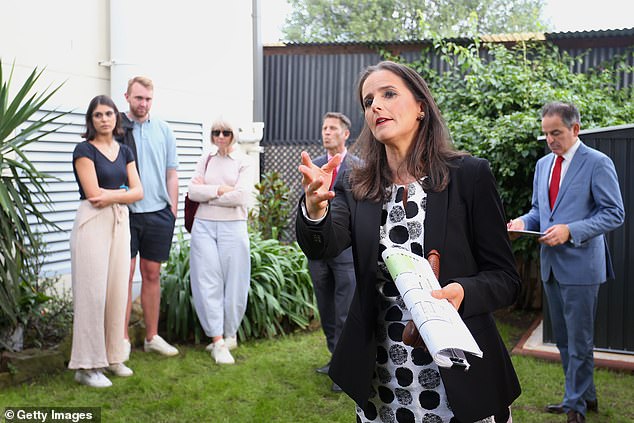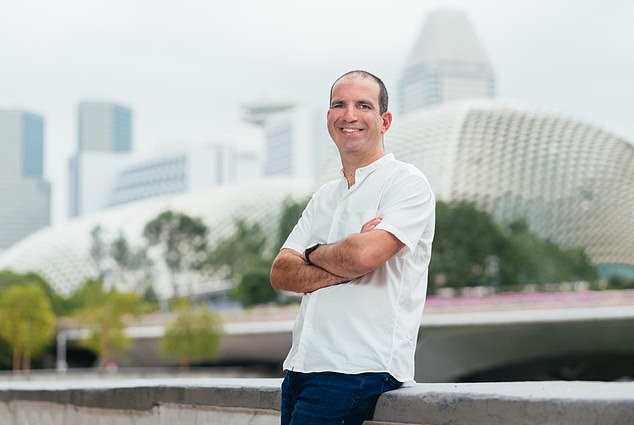A tech entrepreneur has blamed Australia’s cost of living crisis for stifling innovation in Australia – those on a $200,000 salary can no longer afford a typical house in Sydney.
Yaniv Bernstein, host of The Startup Podcast, said the fact Australians needed to earn much more to pay their mortgage or rent meant many innovative types were unwilling to leave a well-paid job to try something new in technology.
“The higher cost of living means you need to earn more money just to put food on the table, put a roof over your head, so it’s less attractive to start something,” he told Daily Mail Australia.
‘Another thing that startups depend on is being able to hire employees who work for below-market salaries in exchange for capital, something very common in the technology sector.
‘Very often you will find people who would like to work at a startup but cannot afford the pay cut.

A tech entrepreneur has blamed Australia’s cost of living crisis for stifling Australian innovation, as people shun startups to stay in secure jobs because a $200,000 salary no longer buys a typical Sydney home ( (pictured, an auction at Hurlstone Park).
“They don’t live extravagantly, they don’t try to maximize their money before spending it on frivolous things, but they have to pay the rent, they have to pay the mortgage, so that keeps them working for bigger companies and with higher salaries, when in “They could actually be adding more value to a startup.”
Australia is now so expensive that a professional needs to earn more than $214,000 a year just to afford a typical house in Sydney.
This individual would still be in mortgage stress, despite being among the top three percent of earners.
Australia, the world’s largest exporter of iron ore, also relies on resource exports for government revenue, as other first-world nations capitalize on the rise of artificial intelligence.
Bernstein, who has worked in the tech industry for the past two decades, was previously COO of Airtasker and high-end mobile phone and laptop subscription group Circular.
The Sydney-based technology expert and angel investor said startups worked best when someone could work full-time on creating something new, rather than doing it as a part-time side hustle.
“Many of these larger, more ambitious innovations require real focus and obsessive interest in the problem, and that’s something you can’t do in parallel,” he said.
‘This is a globally competitive market, so when you say, “Why can’t people do it as a side hustle?” and the answer is, yes, they can do it as a side hustle in Australia, but the same person could do it, in Germany, full time.
‘So who do you think will be most successful in solving that problem?
‘From the beginning you want to hire other people; You don’t just want them to work for you a few hours a week; you have a lot of things to do and therefore you want them to be able to commit to that.’
Sydney is even more expensive than New York or California’s big tech cities like San Francisco and San Jose, which are the center of the AI revolution.
Bernstein, who grew up in Melbourne, said this meant Australian tech entrepreneurs he knew had moved to the United States to grow their businesses.
“They moved to the United States to grow the business; they intended to keep the rest of their team in Australia and have actually seen that hiring people in places like New York and San Francisco is in some cases cheaper than local equivalent in Australia,” he said.
“People there have more experience in startups; Australia is already losing because of the higher cost.”
“Higher housing costs lead to higher labor costs and lower competitiveness in this global environment.”
Bernstein argued that a less innovative Australia would also be bad for living standards, as Australia has been in a per capita recession since early last year, where output per worker has receded.
“If we rely on just being a resource economy forever, we are really missing out on a trick to raising our living standards and creating the jobs of the future for Australia,” he said.
Australia has produced workplace software group Atlassian and graphic design software company Canva.


Yaniv Bernstein, host of The Startup Podcast, said the fact Australians needed to earn much more to pay their mortgage or rent meant many innovative types were unwilling to leave a well-paid job to try something new in technology.
Its founders, Mike Cannon-Brookes and Scott Farquhar, and Melanie Perkins and Cliff Obrecht, are Australia’s richest young billionaires.
But Bernstein said its successes did not mean Australia had a reputation as an “out of country” inventive nation when asked about the invention of the ute, the Victa lawnmower, the Hills Hoist clothesline and WiFi.
“I don’t think Australia has that reputation,” he said.
“I’m not convinced we’ve ever surpassed our capabilities.”
Australia’s cost of living crisis is so severe that Sydney’s median house price of $1.395 million is well beyond the reach of someone earning an average full-time salary of $98,218.
RateCity estimates that banks can now lend someone 5.2 times their pre-tax salary, following 13 Reserve Bank interest rate increases in 18 months, taking the cash rate to a 12-year high. 4.35 percent.
That means a well-paid person with a hefty 20 per cent mortgage deposit of $279,043 would need to earn $214,649 to pay off a $1.116 million mortgage.


Sydney is even more expensive than New York or California’s big tech cities like San Francisco (pictured) and San Jose, which are the center of the artificial intelligence revolution. Bernstein said this had seen Australian tech entrepreneurs he knew move to the United States to grow their business.
Even then, this individual would be paying 38 percent of their taxable income in mortgage payments, well above the 30 percent threshold for mortgage stress.
This would be despite being among the top 3.1 percent of earners.
With a variable mortgage rate of 6.24 percent, this well-paid person would spend $6,866 per month on mortgage payments, which would total $82,392 per year.
When it came to being innovative, Bernstein, 43, said the most innovative entrepreneurs weren’t necessarily in their 20s and 30s.
“The most successful age to start a startup is around forty; it’s not about youthful energy, it’s about completely focusing on doing something innovative,” he said.

